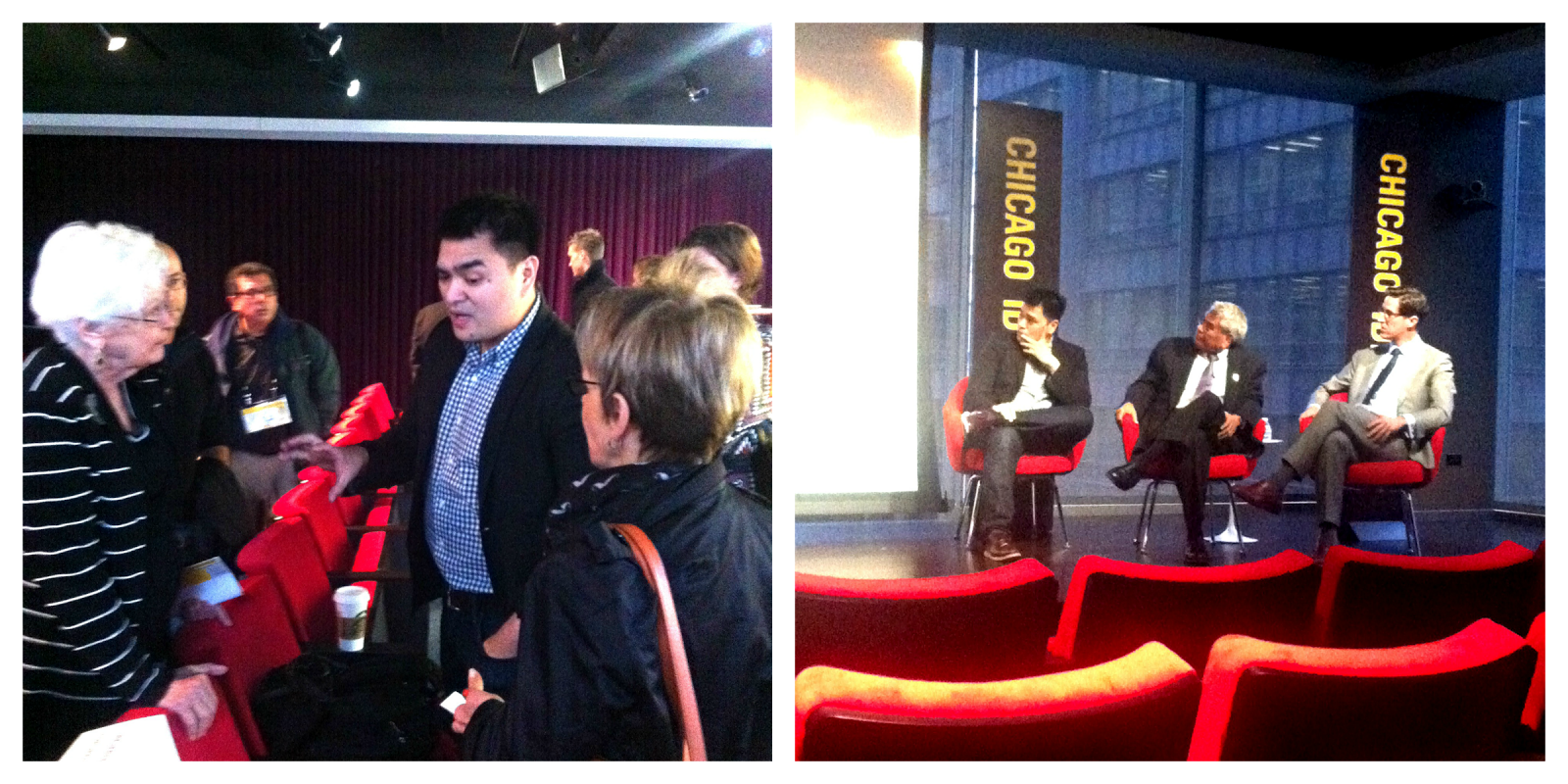The energy bursting through the walls of Morningstar building, located in the heart of Chicago’s Loop and home of a top-level investment research firm, it’s truly contagious. Especially if you’re standing on the seventh floor, sipping free coffee.
Add to that a dynamic panel discussion featuring Jose
Antonio Vargas and Eliseo Medina — two groundbreakers for immigrant rights — and you’ve got a recipe for inspiration.
Everyone who bought a ticket to Chicago Ideas Week’s conversation “From Ellis Iceland
to ICE”, this past Wednesday, agreed on that.
The
210-seats auditorium was half-full at best, but the attendees —many sharing an
immigrant upbringing — were far from being apathetic. They asked uncomfortable questions and wanted strait-forward answers. For
some, learning more about this topic meant filling in pieces of a family
puzzle. “I always felt guilty for being an American citizen, because my siblings
spend a long period being undocumented” Angie Jaime, 25, a Mexican social media
strategist born in the U.S., told me while we waited for the conference to
start. “I certainly don’t take my status for granted”, she added, minutes
before listening to Jose Antonio Vargas, the most famous undocumented immigrant
in America.
As
everybody waited for Jose and his fellow speaker, another person attracted all
eyes.
This young woman sitting near the stage was vigorously drawing on a huge
whiteboard, what turned out to be a graphic story of the event itself. I later
found out she is a 23 years old illustrator, who works for Ink Factory, a
company specialized in real-time hand-drawing visuals. By the time speakers took up the stage, her marker had created a Statue of Liberty followed by the word “Immigration”,
written in capital letters. One hour later, an array of symbols and phrases —
like Eliseo Medina's quote: “It’s easy to demonize what you don’t know”— left
the audience in awe of her talent.
The
former International Secretary-Treasurer was actually the first to speak.
After a lifetime fighting for the rights of immigrants living in the U.S. — sometimes
literally — Mr. Medina, 68, could talk for days on end about what needs to be
done in order to change the lives of more than 11 million undocumented aliens
in America. He should know better; his Mexican father was one of those
people. As soon as he started speaking, people pulled out their smartphones and logged into Twitter, typing away his nuggets of wisdom. And there were
plenty.
“Almost 75% of field or construction worker, nannies and restaurant staff are undocumented people. If we remove them, the economy will collapse” he said in perfect English. His oval glasses, white hair and black suit demanded respect, but his spunky purple tie and heartfelt tone gave away his Latino roots. “Immigration reform isn’t brain surgery; it's not hard”, he continued, which made us nodding our heads in approval.
But
we weren’t hearing the whole truth. This time, last year, he
deliberately starved himself, in a heated tent, near the steps of the Capitol — Obama family came to visit— for this exact immigration reform. He didn’t eat
for 22 days and dropped 20 pounds. So it must be at least complicated.
The
same word can perfectly sum up the life of Jose Antonio Vargas, 33,
Pulitzer Prize-winning journalist and filmmaker. According to the law, he shouldn't be touring the United States, trying to raise awareness about
immigration system gaps — traveling without any American identification
documents — but deported to Philippines, his home country.
A combination of formal high education and street
wisdom, Jose gain international fame in 2011, after writing an article for the New
York Times. The title pretty much says it all: “My Life as an Undocumented
Immigrant”.
Instead of offering us a sample of his flamboyant personality, he decided to take it down a notch. Spiky hair, blue and white plaid shirt underneath a black jacket, no tie, dark blue jeans and brown slip-on shoes, he look professional, yet relaxed. His signature playful eyebrows did much of the talking. “In the last two years, I went to 300 events in 24 states”, he announced right from the bat, admitting that fame serves him as a shield against deportation.
“People don’t know what immigration reform is. The gap between perception and reality is oceanic” he told us, explaining he had been called all sorts of names — including “illegal faggot”, referring to his sexual orientation —just because he is undocumented. “I grew a thick skin”, Jose concluded, after walking us through a brief recap of his past, something he must have done over a thousand times. I wondered if he was ever bored by it.
Once the event ended, a
small group of people lingered in auditorium to share opinions with him. One
by one, they thanked, interrogate or asked him for help, while Jose remained friendly
and equally interested in everyone. “I’m sure you have a bunch of these” I said
when it was my turn, handing him several business card. His response took me by surprise. “You’re the
girl from Twitter right? I knew you would come” he — the guy who has close to
fifty one thousand followers on Twitter— instantly answered. Before leaving, we
took a photo together. It was during those 4 seconds that it hit me: “I understand why you refuse to leave this country behind. It’s the
best thing that happened to me too”.






